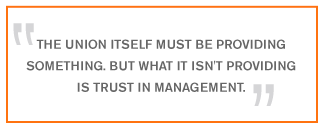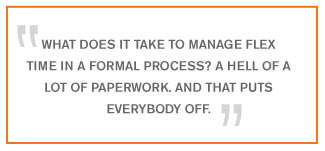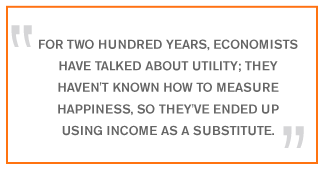How much trust exists between you and your employees?
This isn't just an idle, theoretical question. The fact is, if you could instill the right amount of trust in your workplace, you and your employees would be a lot happier.
 |
That's what John F. Helliwell has discovered, and you can trust his research. Dr. Helliwell, one of the most respected economists in the world, is the Arthur J.E. Child Foundation Fellow of the Canadian Institute for Advanced Research, a member of the National Statistics Council, and a Research Associate of the National Bureau of Economic Research. He has taught at Oxford, Harvard, and the University of British Columbia; advised the Bank of Canada; and published many books and articles on economic topics. He is a Fellow of the Royal Society of Canada and an Officer of the Order of Canada.
But now Dr. Helliwell is studying what makes him -- and everyone else -- happy. Applying the tools of economics to the subject of well-being, Dr. Helliwell has discovered a number of factors that affect life satisfaction. Work is chief among them, says Dr. Helliwell, and trust in coworkers and management has an enormous effect. That's because trust is essential to both workplace engagement and life satisfaction in general. But issues of trust play out in funny ways in the office.
In this interview, the first of two parts, Dr. Helliwell explores the connection between distrust and unionization, why too much paperwork can cause workers to feel less engaged, and why we are apt to keep office politics alive, even when it makes us unhappy.
GMJ: What have you found regarding the effects of workplace trust on life satisfaction?
Dr. Helliwell: When we ask about life satisfaction and trust, it turns out that trust is enormously highly correlated with life satisfaction. Just moving up one point on a ten-point scale of trust in your management has the life satisfaction equivalence of something like a one-third increase in income.
Of course, a variety of aspects of what goes on in your life are more important than your income. To work in a pleasant atmosphere, one in which you feel you can trust the people around you, turns out to be very important for people. Lots of people routinely overestimate the life satisfaction they will get from consumption, and they routinely underestimate [the life satisfaction] they will get from human interactions.
So when choosing jobs, people routinely do things like concentrating on income. That ends up making them less happy than they would have been had they chosen a better workplace.
GMJ: You've found some interesting differences in workplace trust among union and nonunion workers.
Dr. Helliwell: Yes. When we ask, "What is the level of trust among colleagues in your workplace?" we've found that there's no difference between union members and nonunion members, looking across the whole population. But you find that trust in management is systematically lower among respondents who are union members.
You could imagine the linkages two ways. A low-trust environment is exactly the kind of environment that would either demand or be open to union organization. It's also probably true that the people involved in both sides of the union negotiations within a workplace are inclined to create and maintain "us versus them" distinctions, and acrimonious relations would be damaging to trust relations. Another feature of this is that although union members are much lower in their trust in management, they are no lower in life satisfaction.
GMJ: Why is that?
Dr. Helliwell: Perhaps the union provides them protection in the workplace for the consequences of their low trust in management. A union shop is more rule-determined, and there are more, as it were, defenses for the individual worker. In an unsatisfactory situation, the existence of the union and the solidarity the workers feel might give them a kind of protection against what otherwise would be the risks they'd suffer by not trusting the people who had control over their workplace.
This is guesswork at this stage -- we haven't gotten enough evidence to unpack that. But it's interesting that somehow, although there is a tight relationship between trust in the workplace and life satisfaction on average, unionized workers are not less happy than nonunionized workers, which means the union itself must be providing something. But what it isn't providing is trust in management.
GMJ: How trustworthy do most people find their workplaces?
Dr. Helliwell: The average is 7½ on a scale of 10, so it isn't as though the typical workplace is poisoned; the vast majority of responses are in the top half. But moving from average to something super still has a pretty big payoff. Think what it would be like to move from an average workplace into an environment where you really felt you were in a team. That's where you get a high-trust environment because that means other people are going to be looking out for you, and you'll be looking out for them.
 |
GMJ: Why is trust in the workplace so important for life satisfaction?
Dr. Helliwell: Trust is important everywhere. Trust in the workplace is important because you spend a large fraction of your waking hours there, and it characterizes a good part of the space in which you live your life. I think, in human terms, it's not so strange that people are unhappy in an environment where they have to watch their back, and they're much happier in an environment where people do care for each other. That's another way of saying people like caring for each other as well as being cared for.
GMJ: So why do so many of us create workplaces entrenched in politics? Why do we set ourselves up to be unhappy?
Dr. Helliwell: I don't know. But trust is asymmetric; once you've lost it, it's very hard to build it up again. So there are probably a lot of offices and workplaces where people realize it's a low-trust environment, and it's just hard work trying to reestablish trust. But remember, all humans need to connect. If you can't use your connection time at the office to do things that everyone shares in that are positive for the venture, a lot of that connection time will end up being unproductive office politics. But you're still connecting.
We don't talk about the weather because it's so fascinating; the weather is just a way of getting started with people. The people connection is what matters, and you want to do something that ends up making you feel better, both of you, than before. Of course, griping against the common enemy turns out to be the most natural thing, but as you can imagine, that makes it a little harder to reestablish the trust with the person you're griping about.
GMJ: How does workplace trust affect issues like working from home or flex time?
Dr. Helliwell: What does it take to manage flex time in a formal process? A hell of a lot of paperwork. And that puts everybody off. Think what happens in low-trust environments with expense accounts. You get a couple of bad apples who fudge their accounts, then you get all the accountants covering their rears all the ways they can, which usually means they cover themselves with paperwork. And that in itself lessens the extent to which employees feel they can trust the whole enterprise. It's a pretty expensive process, considering what workers who trust you and feel trusted will do for you.
I have a feeling that there probably is a matching decrease in mutual trust and commitment with the increase of paper trails in the enterprises that go that route. At the very least, people say, "This is surely a waste of our time." If you go further, you begin to think, "What does this tell me about what they think of me as a trustworthy person? If you don't trust me enough to do my expenses without all this hassle, how can you trust me to do my job?"
GMJ: What does that kind of negativity mean for employers?
Dr. Helliwell: It probably means that in a lot of workplaces, people on either side, whether they're employer or employee, do not realize disaffection is linked to the quality of workplace trust and engagement. So they haven't even thought seriously about what they could do to increase the sense of common engagement. In other words, if they really knew these results, and believed them, they'd probably be rethinking a lot of this paperwork.
There are a whole lot of things that are done for other purposes that yet have implications for the level of trust in the workplace. Another way of putting it is these estimates of the value of workplace trust are so large, you'd think there would be things out there that could be done that would cost a fraction of that amount and would leave everybody better off.
GMJ: Such as what?
Dr. Helliwell: You could reduce the risk of malfeasance on expenses by ways that are much more conscious of the human relations cost than those methods that are now used. When you take account of what things like endless paperwork to prove your trustworthiness do to workplace trust, it almost surely is not done effectively.
 |
GMJ: What should managers do when they take over departments characterized by distrust? What should they do to start making people trust each other?
Dr. Helliwell: You can't just say, "Trust me" -- President Nixon ran that one into the ground. You've got to actually do something in terms of behavior, and it's ideal if you don't do it as a trust-building exercise. You see, trust is like happiness: Happiness is great, but the search for happiness is destructive. Happiness is the consequence of the things you do, and so is trust. A lot of the psychological evidence says that people gain a whole lot in terms of well-being when they do things together and do things together for other people.
So one of the things that some of the organizations that rank very high on these measures do is encourage the people throughout the organization -- and it's important to be bottom-up and not top-down for all the reasons you can imagine -- to foster community engagement. These have to be ideas coming from the people in the organization themselves; it can't be a command from the top. Now, I'm just talking here because I haven't got any science on this, but you know those retreats where you take all the trainees off and have them rappel down mountains or climb trees together for a weekend? That's wheel spinning.
GMJ: Then what genuinely builds trust?
Dr. Helliwell: I think you build trust by doing things together that embody two of the other key elements of well-being: engagement and efficacy. Pro bono work is great for that. You're working together doing what you normally do, but in a different context.
It's also a good recruitment method. People joining a workplace are acutely aware of this sort of thing. They want to go to some place where the right things are done for the right reasons in the right ways.
GMJ: Dr. Helliwell, you're a highly regarded economist who could make a very nice living doing nothing but tossing off the occasional bon mot about monetary policy to the government. Why do you study well-being?
Dr. Helliwell: I remember coming across the well-being data that found that in those U.S. states where social capital is higher, people are happier. So I said, "Happier, happier?" I've been an economist my whole career and never heard "happy" measured.
For two hundred years, economists have talked about utility; they haven't known how to measure happiness, so they've ended up using income as a substitute. So I spent a number of years working with life satisfaction data. I realized that they do tell a powerful story, so I'm a convert.
But I didn't start out as a believer -- I started out as an empirical researcher who now says "Eureka!" It is fun working on things that ring true and are important and also link to people very immediately. People's eyes glaze over when you talk about index numbers theory.
-- Interviewed by Jennifer Robison
In the second part of this interview, Dr. Helliwell explains why the phenomenon of globalization may be overrated.